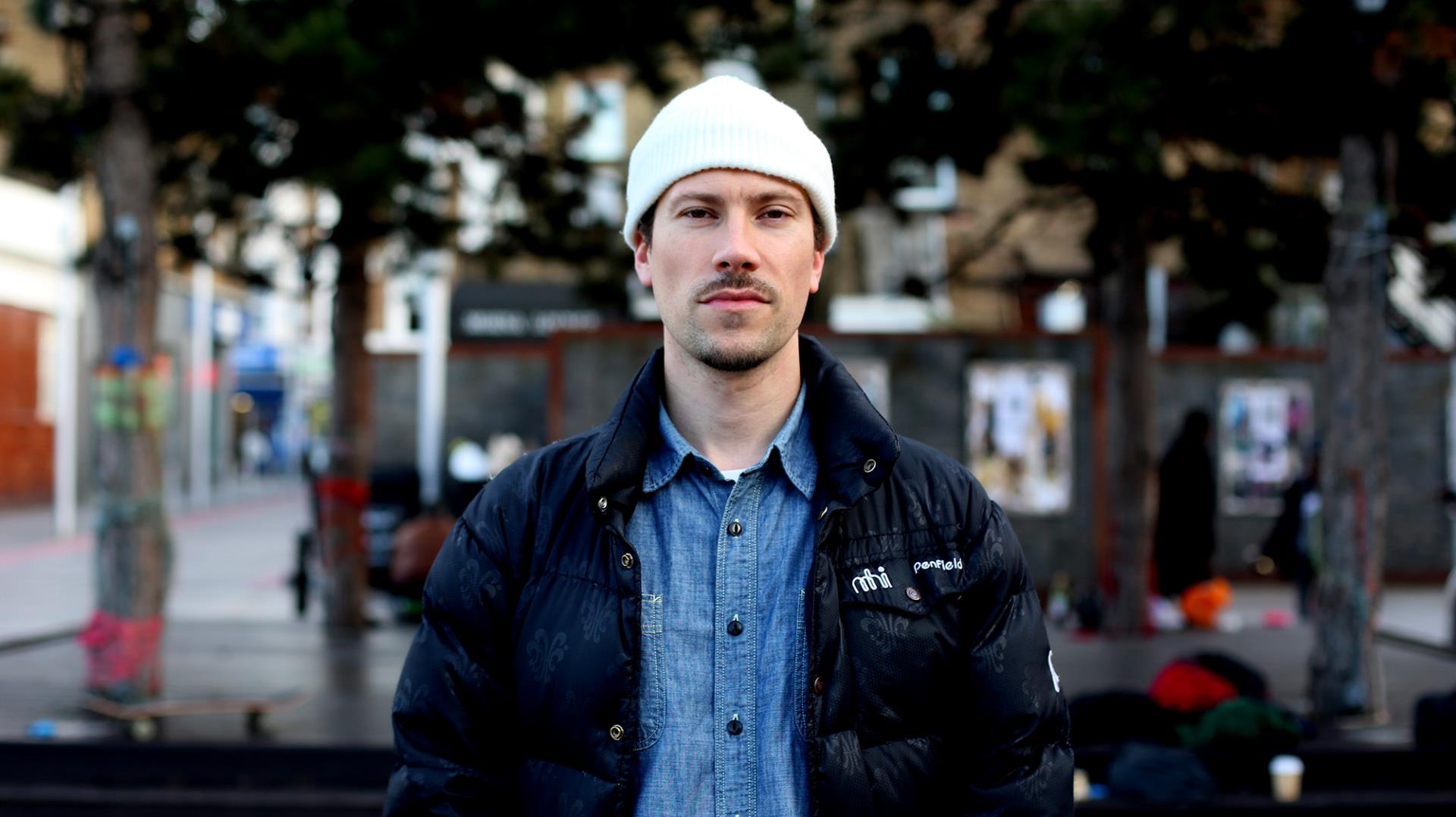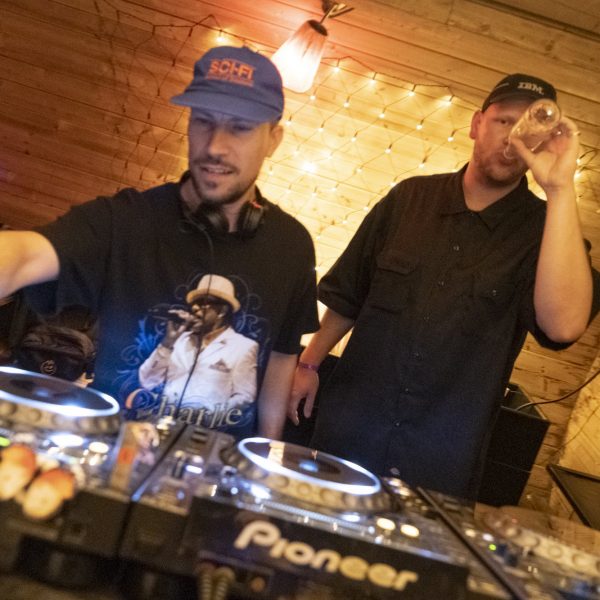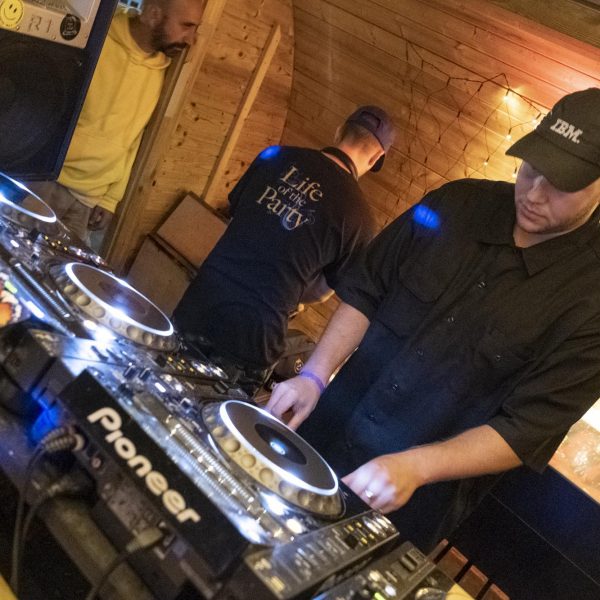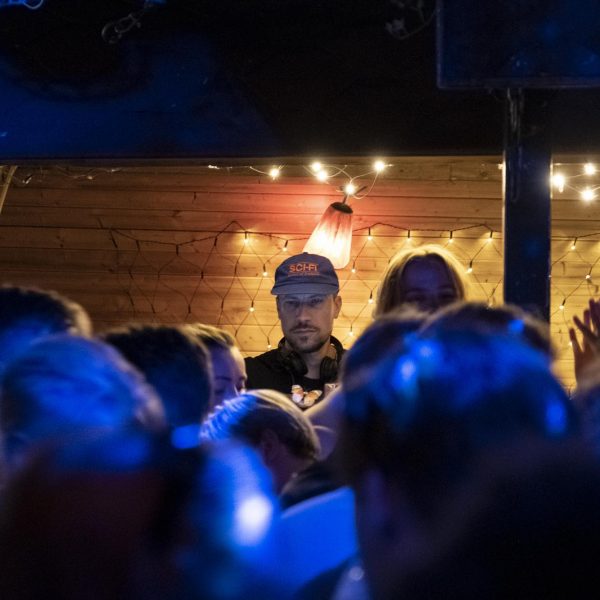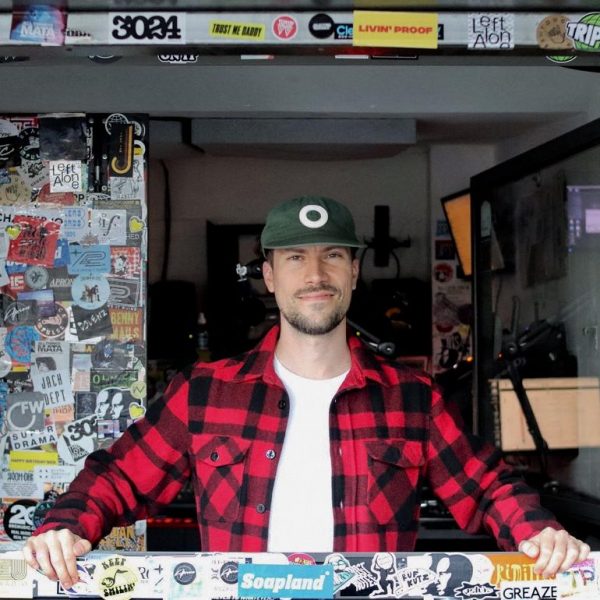Alexander Nut beams with delight, holding a small bag of records at Råkk & Rålls in Oslo. He insists there’s probably much more to dig through in the vast catacombs of music that constitutes the record store’s cellar, but luggage space is limited. Next time he considers, he might bring a bigger bag.
Half an hour earlier, we’re sitting down in a shady spot in Oslo’s Spikersuppa. A brass band is marching their way down Karl Johan Gate with a honking brass noise drifting over the whole park. I have to repeat the question: “Will there ever come a time when you stop buying records?” “Probably not, ” he says confidently. “It’s a habit and that’s the way I grew up, interacting with music. I still love it.”
He still travels with around 50 records (not leaving much space for new finds) and when he’s not playing records, he’s “manufacturing” them through his record label Eglo; a label that has been championing the call for new UK left field club music since 2009 through artists like Floating Points, Funkineven, Fatima and most recently Shy One.
Cutting his teeth on pirate radio, Alexander Nut became something of a tastemaker for a new sound of electronic music coming to the fore in a post-dubstep landscape in the UK. Through his early work at Rinse FM, back in the mid-2000’s, he turned a whole generation of music fans onto the emerging sounds of London’s post-dubstep set, providing a springboard for record labels and artists alike, some of who have gone on to become household names today.
Guided by his own eclectic tastes, which include “anything and everything,” it continues to inform the sound and attitude of Eglo. He left an indelible mark on Rinse, before moving on to NTS, where today he feels that he can “do whatever I want” and there’s an audience out there that will listen to it. It’s given him the opportunity to play the music he didn’t get a chance to play at Rinse, with shows folding in everything from Roisin Murphy to Shy One, tracing a dotted-line through Alex’s own experience in music and his record collection, rather than an obligation to a scene.
That scene has largely dissolved today, diversifying into branches of Techno, House, Grime and UKG, but when it started it was a hive of activity with a “nice mix of east London ghetto kids, mixed with all these nerdy producer guys” interpreting the dance floor in new and original styles of music, predisposed by the same thing that informed Alexander’s eclectic nature.
“The UK music scene was quite tribal” back then according to Alexander when we start reflecting on this time in London. At the time, even at the no-holds-barred Rinse FM, he was “the odd one out.” When he started at the radio station, “there weren’t any platforms really,” and besides perhaps Giles Petterson and Benji B on BBC, there “wasn’t any leftfield, mixed-up shows.” With an objective of “filling a void,” he played only “new underground music,” influenced largely by the “mutation of Dubstep, Garage and Jungle happening” at that time.
Permeating through the nocturnal habits of the UK metropolis at the time, it was music that gestated in the melting pot that is the UK’s diverse cultural backgrounds alongside a youthful inquisitiveness satisfied by the advent of an accessible internet – “Myspace was a hotbed for all kinds of people sharing music” – and a “record scene” that “was still strong” according to Alexander.
Legendary clubbing institutions like Plastic People and FWD played a seminal part in this new underground with Alexander right there at the epicentre “aggregating all this new shit,” for Rinse FM and his growing audience. He stops short of calling it “an obligation,” but feels that he had “a slight responsibility” if only for the people tuning every week. It’s always hard to relay the significance of this time and this scene in the UK for people with no reference point, but as a writer I’ve always believed it should be appreciated in the same respect as what Acid House became through the Hacienda. It wasn’t a specific sound – in fact it was exactly the absence of some musical consolidation – but rather a spirit or an attitude.
“You got to say,” explains Alexander “it comes from black culture, it comes from black music.” By the time Rinse FM and FWD came to the fore however, and on the back of the Internet, it had taken on a whole new significance. “It came to a point when I was a teenager,” he remembers, “and we were listening to that whole time-line; Reggae, Hip Hop, House, Drum n Bass and Garage.” It was, in part, reflected in all “the different communities all living on top of each other,” who “all had these scenes” that were now influencing this next generation’s augury view of future sounds.
The importance of Rinse FM and Alexander Nut could not be downplayed in this legacy. There are still people who come up to him, reflecting on the influence of his show on their formative years as teenagers listening to his broadcasts from their bedroom. It might make him feel “old as fuck” but he conceeds it “planted a seed.” After 8 years at Rinse FM however, he felt ”it was other people’s turn” and he could pass “on the batton” allowing him to move on to NTS where he could change the format to what we hear today.
There’s no need to play the latest, groundbreaking work, giving him the opportunity to delve a little deeper into his own collection. Now it’s more about the “past present and future,” on NTS whereas before “it was all about the future” on Rinse FM.
Reflecting on his own past, Alexander is humble and respectful of the scene he grew up in, emphasising those formidable experiences growing up in Wolverhampton, in the UK’s west-Midlands. The town, located in the UK’s steel belt, is a town lost to an industrial age today, but curiously holds some key moments in the UKs music history, most significantly as the origin story for Goldie, the UK Drum n Bass pioneer, actor and yoga enthusiast. It is there in the same estate where Goldie grew up and tagged buildings, that Alexander Nut’s family has its roots.
Raised in the council estates where you have all “the different communities, all living on top of each other,” the culture, funnelled down to Alexander, found outlets like skateboarding and graffiti before it solidified around DJing. “Seeing Goldie tags” around his neighbourhood, “blew” Alexander’s mind as a youth and he soon realised he “wanted a piece of that.” In what is a familiar trope in DJ stories, graffiti and skateboarding went hand in hand with music and on the back of his older brother’s record collections which went from Hip Hop (“Wu Tang was huge to me”) to Iron Maiden (“I still love Iron Maiden”) Alexander found a real appreciation for the pirate radio stations in his area. “There’s a really strong pirate radio scene in Wolverhampton” and “Skyline FM” run by Dread Lester (“Rest in Peace”) was a particularly strong draw for Alexander. As he was getting into DJing, largely playing Hip Hop, the objective had always been to have his own show on Skyline, and he would eventually realise his dream before moving to London.
Everything from “Jazz, Hip Hop, soul to funk” would inform his listening habits at the time. Fold all of that into the cauldron of London’s effervescent music scene where Grime, Garage, Drum n Bass and Dubstep were being co-opted into House, Techno and Electro, and we have that vibrant “cultural melting pot” that would lay the foundation for Alexander Nut’s career on Rinse FM and eventually Eglo.
Yet again the Internet, Myspace’s and Plastic People’s importance cannot be overstated in Eglo’s existence. It was through Myspace that Alexander Nut first found Floating Points (Sam Sheppard). He had been playing a track called “For You” on his radio show at Rinse FM, when during a CDR night at Plastic People he heard the track being played through the club’s legendary bass-heavy sound system. CDR, like Alexander’s radio show, was a night that championed new producers, allowing unknown artists to bring in their music to hear it through a proper club sound system. The Floating Points track was announced, and Alexander asked the MC, “ where is he, point him out”; his only previous contact with the producer being through Sheppard’s Myspace page.
It turned out Sheppard had been listening to Alexander’s radio show too, and when the two started talking it lead to the creation of Eglo with Floating Points establishing the label through the labels first 7”; the very same track that had been playing on Rinse FM and CDR on that significant night.
“It sold well” remembers Alexander who says it “ignited the flame” and he proffered “I guess we’re a record label now.” Records like Funkineven’s Rolands Jam and Fatima’s Circle followed, with that very same eclectic approach, ebbing through Alexander’s own personal tastes. R&B, Garage, Chicago, Jazz and everything happening around the label in that time, were channelled through Eglo. It’s a “very British institution on these strange overlapping things”, considers Alexander when I ask about the ideologies behind the label.
Eglo “is the sum of its parts.” It’s about “Funkineven, Fatima, Floating Points, Rinse FM and NTS. All these things play a part and it has its own identity. ”Even though Alexander might “listen to everything,” he feels Eglo is not necessarily a representation of his own listening habits, but rather a “a true representation of all these connected things.” It all “started in the basement of plastic people”, and today it represents a network spreading across the world from “Australia to LA” as he continues “making new friends and making connections.” It’s an honest, unique pure creation” he feels, based on those interactions in his musical world. It extends from that first Floating Points record to the latest Shy One 7″ today with every record offering a new node in this expanding musical universe.
Unfortunately, it’s probably also one of the last bastion’s for this kind of label in our hyper-commercialised landscape, which according to Alexander had become “a bit elitist and discriminatory” as more people cottoned on to the music. “As things became more accessible it killed some of the grassroots origins;” possibly represented in time by the change in sound system at Plastic People, right before it closed down. “It went from this monstrous bass-heavy system to an audiophile thing” remembers Alexander and he noticed the “crowd and promoters changed.”
It probably came to its ultimate conclusion by the time Boiler Room came on the scene with Alexander laying blame directly at their feet for this change in musical pursuits. “I’ll say this on record – Boiler Room ruined everything! I‘m not trying to shit on the people that work there now,” he says but at a time when he was still promoting events in London they would often poach artists from his lineup and let Alexander foot the bill.
Putting up “A grand of my own money,” these artists would also play for Boiler Room for free on the promise of promotion, and it left Alexander dumbfounded; “‘You’re doing a free gig for these guys, when they all sponsored up’”. It was “killing grassroots promoters” like Alexander.
Even though he concedes that the platform’s impact in proliferating music is significant, he’s sure “those same people” that found music through Boiler Room ”would’ve been introduced to the same music in a more illegitimate way” regardless. “All these platforms present themselves as these authentic grassroots organisations, but they are just auction sites. It’s all about numbers, what they can sell to their sponsors.”
It’s certainly a world away from anything our generation experienced growing up and anything that Eglo continues to present to the world. I revel in Alexander’s honesty in his objections in a landscape that’s become somewhat careful of these criticisms, for fear of reprisal. Criticisms like these are very rarely brought to light and only spoken in hushed tones and off the record. It takes some real courage to come out and say these things we’re all thinking. It’s probably the reason why Alexander is one of the most respected DJs out there and Eglo records remain a formidable touchstone for us.
Alexander admits, “I’m no longer the bastion of what’s the hottest, what’s the latest thing you know,” but that has only seemed to spur on a drive to contribute only what’s significant, whether it’s the music he plays or the music he puts out there in the world through Eglo.
It might be a cliche to label Alexander a melting pot of these diverse influences, but no other description would suffice on this occasion. From his early Hip Hop and graffiti roots in Wolverhampton; the influence of pirate radio; his own work on the radio; his influence on and from the likes of Plastic People and FWD; and the fact that on a sunny day in Oslo, he’d rather spend his time in a musty cellar looking for records, he’s a uniquely British institution and one of the few positive things that statement infers today.

